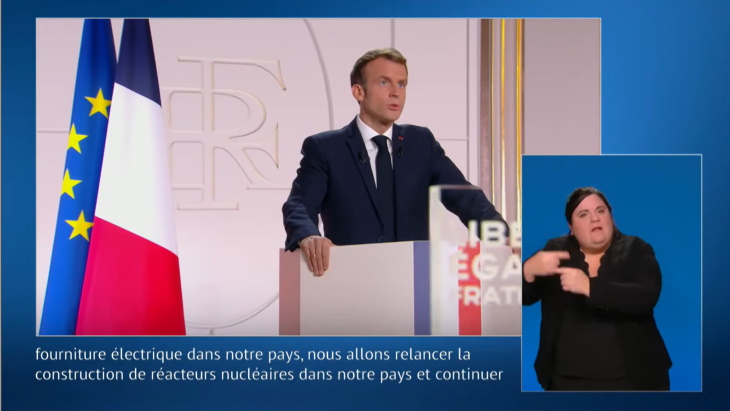"Our economic situation still needs to be consolidated in a world where tensions over supplies and the costs of raw materials and energy generate shortages and inflation," Macron said in his address. "I know many of you are going through it."
He said French citizens are living with the consequences of the current situation every day by paying more to fill up their cars with petrol, as well as facing increasing gas and electricity prices. "What we are experiencing in recent weeks requires urgent responses. This is also why the government has fixed gas prices."
Macron said that to keep energy costs at a "reasonable" level and reduce dependence on imports, France must continue to save energy and invest in domestic carbon-free energy production.
"This is why, to guarantee France's energy independence, to guarantee our country's electricity supply and achieve our objectives, in particular carbon neutrality in 2050, we are going, for the first time in decades, to relaunch the construction of nuclear reactors in our country and continue to develop renewable energies.
"These investments will allow us to live up to our commitments. As we close COP26 in Glasgow, this is a strong message from France," he added.
He said the European Union must work together "to build a credible strategy for reducing our CO2 emissions, compatible with our industrial and technological sovereignty."
Macron added: "This new model of investment and growth in which I believe for France and for the European Union is the one that I will defend on your behalf from next January when taking the presidency of the Union."
Nuclear accounts for almost 75% of France's power production, but former French president Francois Hollande said he aimed to limit its share of the national electricity generation mix to 50% by 2025, and to close Fessenheim - the country's oldest nuclear power plant - by the end of his five-year term, in May 2017. In June 2014, his government announced nuclear capacity would be capped at the current level of 63.2 GWe and be limited to 50% of France's total output by 2025. The French Energy Transition for Green Growth Law, adopted in August 2015, did not call for the shutdown of any currently operating power reactors, but it meant EDF would have to close older reactors in order to bring new ones online. However, under a draft energy and climate bill presented in May 2019, France will now delay its planned reduction in the share of nuclear power in its electricity mix to 50% from the current 2025 target to 2035.
Presidential decision
Nuclear power was at the heart of Macron's France 2030 plan for re-industrialisation, announced last month. The plan includes a programme to demonstrate small reactor technology and mass production of hydrogen using nuclear electricity in this decade. Introducing the plan, he said he would be able to make his decision on the potential construction of up to six large reactors "in coming weeks", anticipating the completion of a pivotal study by Prime Minister Jean Castex and the transmission network operator RTE.
According to a report published by RTE in late-October, the cheapest way for France to achieve its net-zero emissions target by 2050 would be through the construction of 14 large new reactors, plus a fleet of small modular reactors, as well as significantly investing in renewables.
EDF has already stated that it would like to construct six more EPR reactors in France. The group was due to submit a report to the French President in mid-2021, who was then to decide on the construction of the reactors. During a trip to Framatome's Le Creusot plant in December 2020, Macron said the final decision to build new reactors must be taken no later than 2023, when the Flamanville EPR will be in service.
EDF and Framatome are developing a simplified version of the EPR design, known as EPR2. Its aim is to incorporate design, construction and commissioning experience feedback from the EPR reactor, as well as operating experience from the nuclear reactors currently in service. EDF must ensure the financing and profitability of its proposed EPR2 reactor before starting construction of any plants based on the design in France, the country's state audit office has said.





_23009.jpg)

_33392.jpg)
_13618.jpg)






